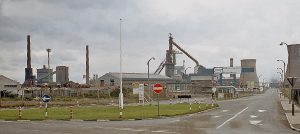Time to rethink a failed economic model
Andrew Pendleton is director, policy and advocacy at the New Economics Foundation
Cross-posted from the New Statesman

The fate of British Steel is evidence that our economic model is broken, and that if we want a new kind of economy to thrive, we need decisive action from government. It should be nationalised, and it’s not too late.
At stake is not just one firm, its 4,400 employees, the 25,000 people who work in its supply chain and the estimated cost to the UK economy of £2.8bn in lost earnings over the next decade. The future of a whole town – a steel town since the mid 19th Century – its identity, the businesses that depend on people’s wages and any sense of future hope is what the closure of Scunthorpe’s steelworks will call into question.
In the north Lincolnshire constituency in which Scunthorpe is located, 55,185 people voted to leave the EU versus 23,797 to remain. Around the dinner tables of central London, many may be observing how the threat of Brexit has worsened the market conditions for already weakened steel manufacturers in the UK – and how, thereby, people in places such as Scunthorpe have shot themselves in their feet.
But Brexit is only part of the latest chapter in the lengthy volume on British Steel’s woes. Since Margaret Thatcher first stood on the steps of Number 10 in 1979, successive UK governments have chosen to withdraw all but the barest bones of support from Britain’s foundational industries, of which steel is one. From then on, Westminster has clung to an ideology that has failed the people of Scunthorpe and many other places that, until the blunt instrument of the EU referendum, had no voice whatsoever in how the economy was run.
So absurd is this economic model, now the default preference of our policy-makers, that in Fife, steel fabrication firm BiFab is in mothballs while energy giant EDF imports the casings for the turbines on its new offshore wind farm from Indonesia. That is not to say the UK’s firms should not be competitive enough to be part of a global market. But from nations like Indonesia to some of our close European neighbours, governments habitually intervene to ensure foundational industries have guaranteed supply chains and amply-filled order books.
British Steel was bought by Greybull Capital in 2016 for £1. The seller was Indian conglomerate Tata who had acquired the plant along with others when it took over ailing European steel giant Corus in 2007. It’s highly debatable that any owner of steel manufacturers in the UK can thrive in the hostile environment UK governments have created the industry. Tata’s remaining business in Port Talbot is also struggling.
Private equity is entirely the wrong model of ownership to keep these industries, and the communities that rely on them, afloat. We don’t yet know the full details, but Greybull has reportedly charged British Steel management fees totalling £9m and interest on loans totalling £33.8m, though British Steel is yet to pay the latter.
Greybull is unlikely to lose out as British Steel enters administration. But the company’s workforce, its suppliers, Scunthorpe and the wider economy will. It will be a disaster politically as well as economically. The failure of such a significant company in a place so resonant of all of the UK’s current woes will further intensify the sense of loss that contributed to the Brexit vote and has as yet only begun to send shockwaves through UK politics.
Failing to nationalise British Steel exposes the current government’s blind faith in markets and refusal to depart from its ideology even when confronted with plain truth. It is not too late for the government to step in and take the company over, which would have the immediate effect of keeping people in work and the economy of a town afloat. This is absolutely government’s proper role.
But it shouldn’t stop there. After nationalisation should come a three-pronged approach:
The first should focus on industrial strategy for British Steel in order to secure its supply chains and to fill up its order book with a proactive procurement policy. The second should be to create a worker owned company and, in the medium term, hand the business over to its employees so they can benefit from an ownership dividend as well as in their wage packets. The third is to green UK steel production in Scunthorpe, for instance by investing in new arc furnaces to electrify the smelting process and using steel close to where it is manufactured to save millions of tonnes of carbon used in shipping.
Scunthorpe deserves a lot better than it appears likely to get from the market fundamentalists in the current government. Nothing short of immediate nationalisation is needed; anything less will be a betrayal of a whole town and will send shockwaves through the UK’s industrial heartlands.


Be the first to comment